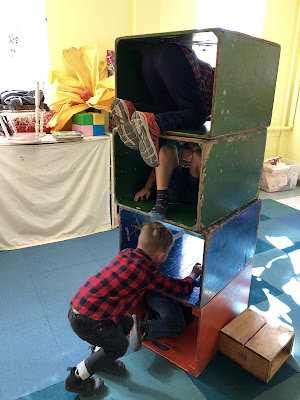Naturally, I help children when they need my help, but most of the time when they ask it isn't
my help they need, but rather help in general, help that could be just as easily provided by other children.
When a kid asks me, for instance, to push them on the swing, I call out, "Audrey wants someone to push her on the swing!" and wait. Sometimes I have to announce it a second time, but invariably, before I've said it a third time, someone has come to the conclusion that
they will be the ones to help Audrey.
If a child asks me to, say, lift a heavy car tire on top of a tree stump, I might respond, factually, "There are a lot of strong kids around who could probably help you." And on most days it only takes one or two requests to find someone willing and able to help.
Asking for help is an important life skill. When my wife was a young businesswoman she often worried that asking for help would cause her superiors, mostly men, to think her incompetent, so she would try to do everything on her own, a stressful and lonely way to go through life. One day, however, in a pinch, she broke down and asked her boss for help. It was an epiphany for her. Not only did he lean in, providing the help she needed, but as she later said, "He thought I was brilliant because I'd come to ask
him for help." To this day, one of her mantras is, "Most people want to help you, but you have to ask them."
She's right. I've had to train myself to not instantly come to the aid of a child who asks because my natural inclination is to just leap to it, but I've come to see that too often what that means is that I wind up doing it
for the children when one of the main goals of any education is for children to learn to do things for themselves, and that includes asking peers, rather than adults, for help. Again, I have to use my judgement, sometimes they need adult help, but most of the time, the kids can do it for themselves, including helping one another.
Yesterday, a couple of girls wanted to stack our large wooden boxes to create "bunk beds." They're heavy things, awkward for small bodies to hoist. Most children need help to lift them. They managed stacking the first box on their own, but then realized that was their limit without help. I was sitting right there, but being children experienced in how our school works, they began calling out, "We need help! Everybody, we need help!"

And sure enough help arrived to assist them in wrangling a third box on top. When they began working on a fourth box, however, I expected they would turn to me. Honestly, I was nervous about the idea of stacking them four high. I knew that their plan was to climb to the top to "sleep" and an unsecured tower like that could easily fall with children clambering all over it. I was prepared to issue my adult cautions, but when they took it on without even turning toward me, I figured my job was to step a little closer, to be prepared for a rescue if necessary, but to allow them their project. It wasn't easy. Indeed, I had thought it likely impossible, but four of them working together got it up there. (I then unobtrusively nudged the boxes into alignment to satisfy my concerns as they curled their bodies into those empty bunks.)
"Look what we did, Teacher Tom! We made bunk beds!"
I answered, "You asked for help and your friends helped you."
She replied, "They did," then she corrected herself, "We did!"